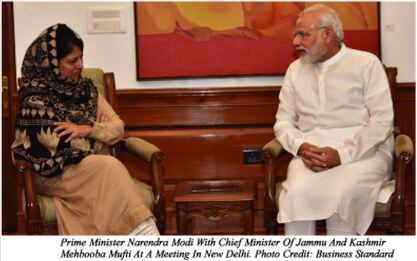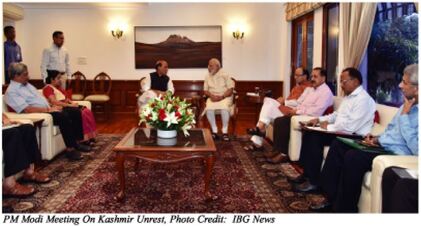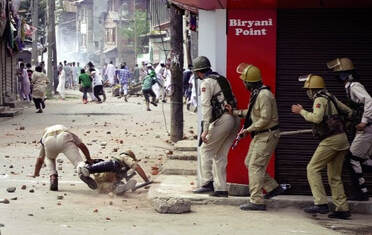Written by Maj Reza Ul Karim (Retd)
India claimed that it has attacked an outpost of the Pakistan based militant organization Jaish-e-Mohammed as a retaliation for the suicide car bomb attack on a convoy of Indian para-military force on February 14 in J&K’s Pulwama district. IAF’s fighter jets carried out this counter-attack inside Pakistani airspace at dawn on February 26…
There was a dogfight between the Indian and Pakistani jets over the LoC in Kashmir last February 27 as the Indians gave chase to attacking PAF fighter aircrafts. India has lost two of its fighter jets with one pilot being captured by Pakistan. The former Cricket World Cup winner cricketer and present PM of Pakistan Imran Khan has been admired by the whole world including many Indians as he has returned the arrested pilot to India and walked towards de-escalation.
There is a long history of conflict between these two hostile nuclear capable neighbours India and Pakistan. After their partition and independence in 1947, they engaged in three different wars. The Hindu ruler of Kashmir Maharaja Hari Singh represented Muslims and being unable to choose between India and Pakistan, he decided to stay neutral. His decision didn’t bring any benefit instead tensions kept rising and in 1947-48 the first conflict turned into the first Indo-Pak War. India asked for UN’s intervention for the conflict which temporarily drove them towards ceasefire and agreed to hold a referendum. India was optimistic about the winning the referendum but Pakistan continued the hostilities and later in 1949 it agrees to the ceasefire which created present border or de facto border of LoC and India gained control over 65 percent of Kashmir’s territory. India and Pakistan were engaged in two more battles, Second Indo-Pak War in 1965 and Kargil War in 1999. Currently three countries claim over different parts of Kashmir. India controls over Jammu, Kashmir Valley, Ladakh and Siachen Glacier; Pakistan controls over Azad Kashmir and Gilgit-Baltistan; China controls over Demchok district, Shaksgam Valley and Aksai Chin. The Kashmir conflict isn’t only between India and Pakistan, militant organizations also fight for their autonomy from India. The militant organizations are Hizbul Mujahideen, J&K Liberation Front who wants the liberation of Kashmir and Pakistan based Lashkar-e-Taiba (LeT). It’s believed that LeT was behind the Mumbai attack in 2008 and Islamabad attack.

Frosty and mountainous Kashmir has been ruled by India and Pakistan for more than 70 years. These two countries might engage in conflict again over the Kashmir issue. Glacial water that flows through Kashmir meets the demand of water and electricity for 1 billion Indian people. Pakistan also largely depends on this glacial water for its agricultural development. With the increasing demand for water and electricity, India is looking forward to this region to produce more hydro-electricity. Pakistan fears that India might create obstacles to its right to this glacial water and use that as a tool for negotiation.
So, Kashmir is a national security issue for both the countries, whose exclusive control would be a threat for each other. India and Pakistan signed Indus Waters Treaty with the help of World Bank in 1960. According to this treaty India controls over Beas aka Vipasha (470 KM), Ravi (720 KM) and Sutlej rivers; Pakistan controls over Indus, Chenab and Jhelum rivers. As all the rivers flow through India so India was given special provision to produce hydro-electricity.
Another jeopardy is global warming which initiates record melting of the glaciers, the source of water in the rivers. Glacial flow from the Himalayas has been melted approximately 174 Giga Tonnes of it, the melted water responsible for flash floods in both the countries. Rapid loss of glacial water would create long term electricity deficiency in both the countries which would reduce economic growth and dry riverbed in the summer would eventually destroy the agricultural sector.

Kashmir is the main source of water and electricity for both the countries India and Pakistan. Exclusive control over this region would make a zero-sum game where control over the glacial water and rivers would create jeopardy for each other. Kashmir’s natural beauty attracts everybody, not only that, as a tourist attraction it’s contributing to the economies of the countries. Kashmir is a mountainous elevated region, it has a great impact on national security of both India and Pakistan. This region is full of natural resources which is capable to contribute to both country’s economies. The only window to Central Asia for India is Kashmir. If China or Pakistan gains control over the Kashmir’s Siachen (both rivals to India), it would reduce security of India’s northern frontier. Kashmir is called the crown of India. India is incomplete without J&K. There are reasons that Kashmir (J&K) is important for India.
Firstly, J&K is a natural obstacle to the intruders. Uneven terrain, dense forest and frosty weather make it difficult for the intruders to enter India. Without J&K under India’s control any intruder get easy access on their entry which means more terrorist attacks, more discontent etcetera.
Secondly, India uses the water from the rivers of J&K. Water resources in J&K are very important for Indians live in Punjab (Ranjit Sagar Dam). If India loses those water resources it would not only affect Punjub but also Hariyana and Delhi. It also will be able to control the flow of the Indus thus establishing control over Pakistan’s moves.
Thirdly, Amarnath Temple, one of the most important Hindu pilgrimages located in J&K. If India leaves its control the temple would be abandoned and another temple of Vaishnava will also become nothing but abandoned.
Fourthly, on the safety point of J&K, there are many strategic passes or roads (Zoji La, Shipki La and Karakoram). Strict surveillance of this passes or roads is very important to India. Kashmir is Pakistan’s main artery. Pakistan depends on Kashmir for the water resources. If India exclusively controls Kashmir, the link between China and Pakistan would close entirely. Kashmir under Pakistan will help China to enter the Indian Ocean. So, China wants Pakistan to be strong, though China already adopted One Belt, One Road initiative.
Partially, it is as much as important for Pakistan but not much that important for India because Pakistan’s all water produce here and the old Silk Road partially located in Kashmir which used to connect China and India with Arabia and Europe. The Red Line here which stretches from Kashmir to Gwadar Port in Baluchistan has been revived by the CPEC (China Pakistan Economic Corridor), where the Indian Blue Line has been connected with Iran’s Chabahar Port and Afghanistan by the ocean route.
In order to access the Red Line India must take back POK from Pakistan otherwise Pakistan won’t let India access this route.
Another is ideological reason. Pakistan is largely driven by ideology. Their ideology is Jinnah’s “Two-nation Theory”, “Hindu and Muslims cannot live together”. If Kashmir goes away, India will lose- try to understand like this that why India will never give independence to Kashmir. Questions may arise, why situation in Kashmir may deteriorate before improvement? Why Kashmir is a top issue? Why always Kashmir issue is bring forwarded? The most important reason behind this is Pakistan’s Military Strategic Establishment or Military Strategy, who always try to influence the government by placing the Kashmir issue before them. Pakistani military thinks they will lose their importance once the issue resolves.

Kashmir issue is the trump card for their politicians, military, ISI and people in power. The question may arise for India also that why it is failing to resolve the Kashmir issue? The main obstacles for India are Pakistan’s all weather friends Saudi Arabia and China. Pakistan has been suffering from bankruptcy for years, in this situation, Saudi Arab’s financial help and China’s infrastructural and military help are playing vital role for Pakistan. Moreover, China does not fully cooperate to improve relationship between India and Pakistan because in this way India gives more attention to the Kashmir issue than the India-China border and China gets its benefit. So, China always stands by and fully supports Pakistan on the Kashmir issue.
Above all, the fighting nations in Kashmir should think about the Kashmiri people. The continuous conflict in Kashmir is destroying the peoples’ lives there. Many of them become victim of border crisis and dies from terrorist activity. Many mothers lose their young children and many children untimely lose their father, this way people there live a miserable life. In one sentence, Kashmiri people have been suffering because of the conflict between these two hostile nuclear capable countries India and Pakistan, the invisible influence of Asian super power China is keeping the issue alive for their benefit.
Maj Reza Ul Karim, EB (Retd): Security and International Relations Analyst

